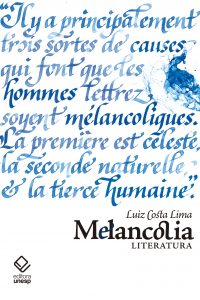Luiz Costa Lima recovers the historical and philosophical meanings of melancholy and their links with literature
Literary critic undertakes a journey through authors from Hippocrates to show how the concept affected different expressions of thought and arts

Melancholy emerges as a Western restlessness for the first time with the Greek physiologist Hippocrates (460 BC -370 BC) as a mood disorder associated with a physical malady caused by black bile. In Antiquity, the Hippocratic tradition preserves this affective state as a disease of the body, which could lead to epilepsy, blindness, or madness. Since then, the concept has changed. It gained new contours from the construction of vast content, at different times, and by the hands of numerous authors. As medicine departs from philosophy, the term coexists with other meanings, often related to the existential condition of men. This is the path researcher Luiz Costa Lima goes through to map the melancholy phenomenon over the centuries and construct Melancholy: Literature [Melancolia: Literatura], published by Editora Unesp.
Divided into three chapters, the text works with a myriad of authors in an attempt to approach the line chosen by the author. The theme contemplates “a thousand faces”. “I’ve decided it was essential to include the examination of some Greek texts, not only contemporary ones, even though due to their lesser proportionality, they indicate both the difference in incidence and the diversity of experience of melancholy in the present day,” Luiz Costa Lima writes.
Costa Lima’s choice to shed light on two decisive writers of modern Western literature deserves attention: the Czech Franz Kafka and the Irishman Samuel Beckett, “representatives of a fiction which, always maintaining melancholy as a particularizing characteristic, assumes a critical, ironic, and satirical view, always negative, in a dialogue with the contemporary world. ”
More than just mapping the theoretical concept of melancholy under human optics over the centuries, Luiz Costa Lima reveals to the reader how the melancholic experience in the Western culture has affected the various expressions of thought in different ways – from medicine to philosophy, from theology to psychoanalysis and the visual arts and literature, showing the changes that historically undergoes the experience of melancholy and its “acceptance” by literature while the book is not restricted to establishing a simple and direct relation of cause and effect between melancholy and literature.
 About the author – Luiz Costa Lima is a literary critic and professor at the Pontifical Catholic University of Rio de Janeiro. He published important books of essays, among them, Mimesis and modernity (1980), Life and mimesis (2000), The control of the imaginary and the affirmation of the novel (2009) and Cracks: theorization in a peripheral country (2013).
About the author – Luiz Costa Lima is a literary critic and professor at the Pontifical Catholic University of Rio de Janeiro. He published important books of essays, among them, Mimesis and modernity (1980), Life and mimesis (2000), The control of the imaginary and the affirmation of the novel (2009) and Cracks: theorization in a peripheral country (2013).
Title: Melancholy: Literature [Melancolia: Literatura]
Author: Luiz Costa Lima
Number of pages: 366
Format: 14 x 21 cm
ISBN: 979-85-393-0665-7
Rights: worldwide free
